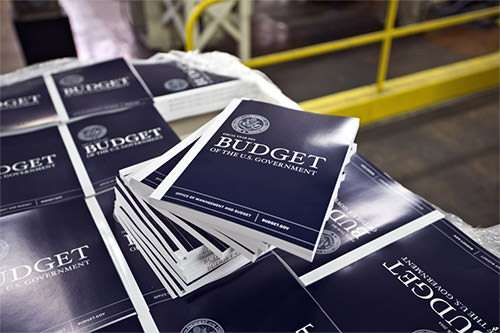The Congressional Budget Office is Still Worried About the Federal Debt

The Congressional Budget Office (CBO) released the latest federal budget baseline update this morning. The baseline is the starting point for its regular legislative cost estimates; it represents CBO's assumptions about what will happen—how much the federal government will spend, and on what, and how that will affect the deficit—if the law stays generally unchanged. When CBO scores a legislative proposal, that score is the difference between the baseline and what the budget office projects would happen under the changes called for in the law.
That means that the baseline is fairly important, and that changes to it are worth noting. The big change in this update is a reduction in projected cumulative deficits between 2016 and 2025: the budget office now expects that the total gap between spending and revenue during that time will be $431 billion less than the $7.6 trillion it projected several months ago. It's a modest reduction, in other words, that still leaves us with more than $7 trillion in annual deficits over the next decade.
The single biggest factor in the decline, the CBO says in its report, is lower expected growth in private health insurance premiums, based on lower than expected spending in 2013 and preceding years. In addition, the budget office also now expects somewhat lower enrollment in Obamacare's exchanges. All told, the health law is now expected to cost $209 billion less between 2016 and 2025 than the January estimate.
This doesn't mean that spending on the health law is going to drop from its current level. In fact, spending on private health insurance subsidies is going to rise quite a bit, and chew up a larger share of the economy in the process, going from about 0.2 percent of GDP today to about 0.4 percent in a decade.
Meanwhile, after a few years of stability, Social Security and Medicare spending are set to rise as a percentage of the economy, jumping from 4.9 percent and 2.9 percent of GDP this year to 5.7 and 3.6 percent of the economy in 2025.
In addition, CBO projects a big spike in federal debt payments over the next 10 years, in part because interest rates are expected to rise, and in part because "debt held by the public is projected to increase significantly under current law."
The next few years will be relatively calm, but the overall picture is fairly bleak. Federal debt will hold around 73 or 74 percent of GDP over the next several years and then rise to 77 percent by 2025—which leads to the CBO issuing the following warning on the first page of the report:
Such high and rising debt would have serious negative consequences for the nation: When interest rates returned to more typical, higher levels, federal spending on interest payments would increase substantially. Moreover, because federal borrowing reduces national saving over time, the nation's capital stock would ultimately be smaller and productivity and total wages would be lower than they would be if the debt was smaller. In addition, lawmakers would have less flexibility than otherwise to use tax and spending policies to respond to unexpected challenges. Finally, a large debt increases the risk of a fiscal crisis, during which investors would lose so much confidence in the government's ability to manage its budget that the government would be unable to borrow at affordable rates.
We've seen this same basic warning from the CBO before, but it's still worth highlighting, because it underscores the looming economic risks of our federal government's debt trajectory. Yes, we're in a period of relative budget calm, at least for the moment. But given what's coming, that's reason to take action to stabilize and reduce the nation's long-term debt problems now rather than postpone working on solutions until a crisis has arrived.


Show Comments (10)